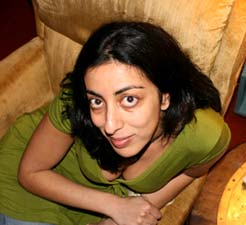Excerpt from Oscar of Between, Part 1C
by
Betsy Warland
Waterloo Station. South Bank, Lambeth. 30.03.07.
Oscar
: en route to Camouflage Exhibit.
Checks the station clock: 13.20. Decides
: I am Oscar.
Second proper name.
Seeking her out.
Began first few days in London: Oscar Wilde quote at the Tate; the Oscar in Albee’s play at Theatre Royal. Haymarket.
Began, actually, a few months prior. Former student’s newborn curled into her shoulder. Inquired about its name.
“Oscar.”
Upon hearing
: surge of delight.
Albee’s Oscar. Stranger elegant in his difference. Upon sight of. Introduced each time a startled Midwest character comes on stage. By Elizabeth — Oscar’s unconventional companion — who appears to be utterly conventional, announcing (with Maggie Smith’s wicked aplomb):
“This is Oscar.
Oscar is Black.”
Every time. The audience’s erupting laughter
: relief at each character’s startled awkwardness (meaning, fear).
~~~
Camo’s infiltration in today’s fashion.
The aim?
Of camouflage?
To “see without being seen.”
Voyeurism, counter-surveillance, deception, ambush.
Undercover fantasies played out?
Post bilateral mastectomy, others’ expectations. For prostheses. That Oscar.
— pros(e)thesis—
Absurdity of
: bra-bind if you have them,
camouflage if you don’t.
Not logical.
Logistical.

Guest Writer:
Ayelet Tsabari
Toronto, ON
https://www.ayelettsabari.com/
Excerpt from the story ‘Sign of Harmony,’ from her book of short stories, The Best Place on Earth
published by HarperCollins, Spring 2013
The New Delhi night is heavy with moisture, burnt-garbage smoke and car exhaust. Traffic is congested yet moving: rickshaws, bicycles and cars; brightly painted Tata trucks, adorned with shiny tassels like decorated temple elephants; entire families on the backs of motorbikes, the women sitting sideways, holding on to the free end of their saris. Passengers hop off buses while others hop on, the bus never quite reaching a full stop; some hang onto the bars from the outside as the bus drives off. Cows saunter in the middle of the roads. Ian watches the chaos with huge eyes, forgetting to blink. Then he leans his head against the headrest and closes his eyes, his eyelids fluttering. She understands how he feels. There was no reason to assume it would be different for Ian simply because he is Indian. He grew up in London, after all.
Maya had been fresh out of the army when she first arrived from Tel Aviv. She had started planning her trip in the last few months of her service. All her friends talked about going to India, it was the thing to do after the army, but she was the first one to make enough money to do it, working six days a week, twelve-hour shifts as a waitress on Mango Beach. She went about planning her itinerary as she had her army office work: circled places on the map, placed sticky notes in her travel guide.
Two weeks into her trip, her backpack was stolen on a train to Varanasi: her passport, her traveller’s cheques, her address book, her clothes, her travel guide. Gone. She had nothing but the clothes on her back. It was as if someone had erased her. Not that anyone was looking for her. Her father had refused to talk to her since she had joined the army—no place for good Orthodox girls—and her mother had never been strong enough to fight him.
While she was stranded in New Delhi, sorting out the passport and traveller’s cheques, sleeping in random travellers’ rooms, she met Vijay, who ran a travel agency from a small glass cubicle in the Krishna Guest House. He and his wife, Amrita, took her in, letting her sleep in the back room, leaving homemade food in stacked tin containers by her mattress. Maya, in return, babysat their daughter, manned Vijay’s office while he was out for lunch, arranged his files in a system she had learned in the army. Amrita gave her one of her shalwar kameez to wear, stamped a bindi to the middle of her forehead, and when Maya looked in her small hand mirror, moving it over her body to try and construct a full image, she was stunned by her reflection. Her small frame, her dark skin, her straight black hair. “Like Indian girl,” Amrita gasped, wobbling her head from side to side, in that gesture Maya later adopted, somewhere between yes and no. Even her name was Hindi, Vijay said. In Hindu philosophy, Maya was the illusion we veiled our true selves with. Maya thought back to who she was before India, at the Orthodox girls-only high school her father transferred her to after he’d found God, then in the army, where she’d slept alone in an empty dorm room while the other girls went home for the weekends.
Now, when she walked the streets of New Delhi, the city made space for her, letting her in. She had never expected to experience a spiritual revelation in India, had thought it a cliché, yet here she felt she was unveiling her true self, stripping off the illusion. “Maybe you were Indian in past life,” Vijay offered, and she smiled at that, pleased.




The quiet newness of your language astonishes me. The way you play with words — clever, but not locked-in-the-head clever. You pull me down into tender layers of meaning. Betsy’s/Oscar’s words, yet somehow my own private meaning. You name things I didn’t know existed in me. I read Oscar and recognize myself.
i’m struck by juxtaposing ayelet’s excerpt where maya is startled & pleased to look like an indian rather than an orthodox jew just out of the army with betsy’s oscar’s pleasure of recognition: the resonance of the name & how camouflage is multi-layered for us all – in this world of roles and status we’re seen not as unique selves but superficially identified by gender/race/rich/poor/weak/strong ad infinitum
but what if the recognisable signifiers aren’t present or mean something else?
suddenly we have no ground to stand on & it’s disconcerting/scary
canny how oscar gets under our skin…
So brave and so tender. A child who knows more than we think. Half formed, fully realized thoughts.
Betsy & Ayelet,
Both are such lovely and tender pieces. Each one gently shows us the unexpected places we met ourselves and how we then unfold into ourselves despite conditioning that wants to take us elsewhere.
The pacing of each piece is so very different. With Betsy’s I found myself holding my breath, as if expecting some shock, only to find it was a gentle unfolding steeped with the wisdom of one who has travelled this path for some time. With Ayelet’s I was moved forward quickly into a story I could relate to. The underlying darkness of a father who does not recognize or acknowledge his daughter for who she is. So much is revealed in this simple line …. ” and her mother had never been strong enough to fight him.” this one rang true for me. It caught me off guard as I was surprised by the rising sadness at having had such a mother.
The movement between camouflage in regular life, the need to hide oneself, in the life of someone clearly older who is no longer willing to do this and a young girl who found herself in an army as a way out was intriguing. I get the sense that both did battle for the life they wanted and in the end both were tempered and satisfied by the results.
Thank you,
Jonina Kirton
I love the playfulness of your pros(e) thesis analogy/imagery! and how you are working with camouflage Betsy, and those who do and do not acquire it in it’s various guises…..
Meg Torwl